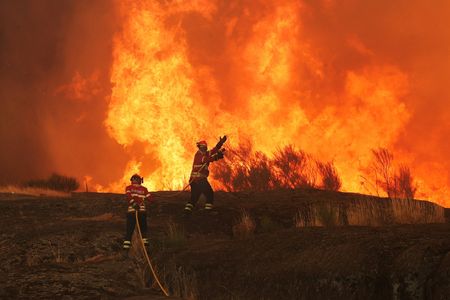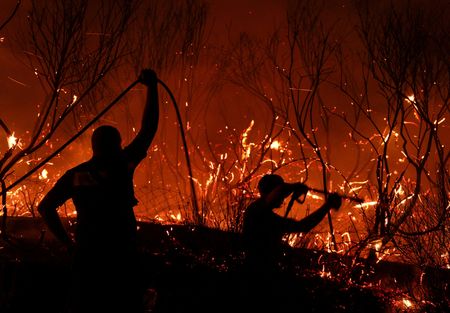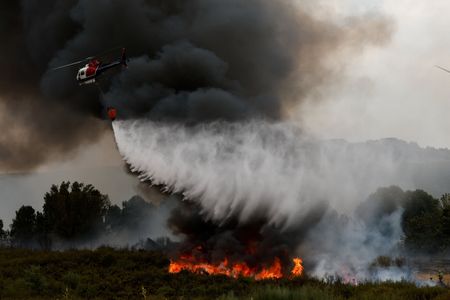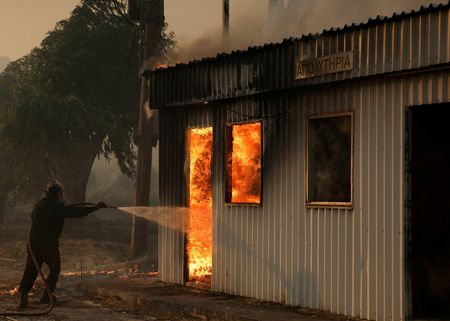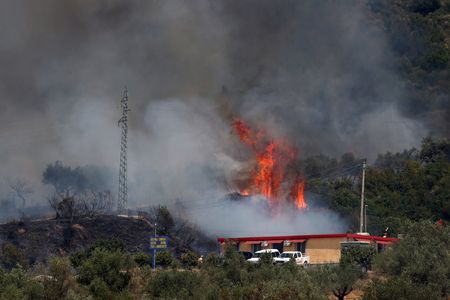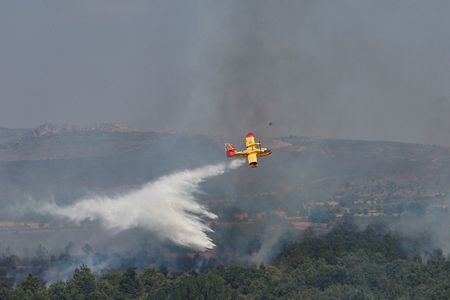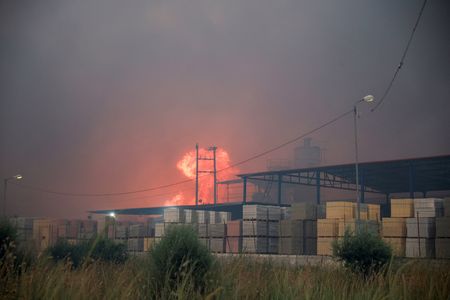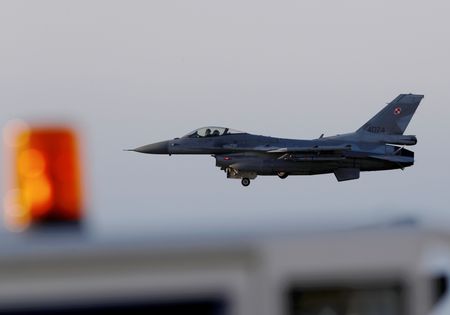PATRAS, Greece,/MADRID (Reuters) -Wildfires caused by arsonists or thunderstorms and fanned by a heatwave and strong winds continued to rage across southern Europe on Wednesday, burning houses, farms and factories and forcing the evacuation of thousands of residents and tourists.
Flames and dark smoke billowed over a cement factory that was set alight by a wildfire that swept through olive groves and forests and disrupted rail traffic on the outskirts of the Greek city of Patras, in the northern Peloponnese west of Athens.
“What does it look like? It looks like doomsday. May God help us and help the people here,” said Giorgos Karvanis, a volunteer who had come from Athens to Patras to help.
Authorities ordered residents of a town of about 7,700 people near Patras to evacuate on Tuesday and issued new alerts on Wednesday, advising residents of two nearby villages to leave their homes.
On the Greek islands of Chios, in the east, and Cephalonia, in the west, both popular with tourists, authorities told people to move to safety as fires spread.
In Spain, a volunteer firefighter died from severe burns and several people were hospitalised as state weather agency AEMET warned that almost all of the country was at extreme or very high risk of fire.
The 35-year-old man had been attempting to create firebreaks near the town of Nogarejas, in the central Castile and Leon region, when he was trapped in the blaze, regional officials said.
He was the sixth person to die this year in wildfires in Spain. Other victims include two firefighters in Tarragona and Avila, according to emergency services.
Working in unprepared landscapes puts firefighters lives at risk, said said Alexander Held, a senior expert in fire management at the European Forest Institute.
Authorities needed to make more effort to anticipate and prevent wildfires by creating buffer zones and clearing combustible vegetation, he said.
“Take an industrial building and imagine there would be no fire detectors, no sprinkler systems, no fire protection doors and no escape routes – firefighters would just refuse to go in, but in our landscape we expect them to do this,” Held said.
The leader of the Galicia region in the northwest, Alfonso Rueda, called the situation there “complicated” and said the weather was not helping. Six active fires were affecting a combined 10,000 hectares (38 square miles) in Galicia’s Ourense province.
SUSPECTED ARSON
Spanish Environment Minister Sara Aagesen told SER radio station that many fires across the country were suspected to be intentionally caused by arsonists due to their “virulence”.
A male firefighter was arrested on Tuesday for fires started in the Avila area north of Madrid two weeks ago, while police said late on Tuesday they were investigating a 63-year-old woman for allegedly starting a series of fires in Galicia’s Muxia area in August.
Police have also identified a suspect who is believed to have suffered burns to his hands after starting a small fire in a beachfront development in the southern coastal Cadiz area, Europa Press reported.
Thunderstorms have caused other fires.
On Tuesday, shortly after 5 p.m., Andalucia’s fire department was flooded with calls by residents alerting of a fire caused by a lightning strike on a chestnut and oak forest in Los Romeros, north of the city of Huelva. The fire prompted the evacuation of around 250 residents but was largely controlled by Wednesday morning.
A blaze in Trancoso in Portugal that has been burning since Saturday took a turn for the worse during the night as a lightning reignited an area that was thought safe, the civil protection service said.
In Albania, Defence Minister Pirro Vengu said it was a “critical week”, with several major wildfires burning across the country.
Some 10,000 firefighters, soldiers and police emergency units struggled with a total of 24 wildfires across the country on Wednesday, the defence ministry said.
Flames reached homes in two villages in the centre of the country, forcing villagers to flee, taking their livestock with them.
“We are going in the middle of two rivers because the fire has arrived,” said Hajri Dragoti, 68, from Narte, who fled with his wife taking a cow, a donkey and a dog. “We can’t do anything, it is like gun powder.”
Spain was in its 10th day of a heatwave that peaked on Tuesday with temperatures as high as 45 degrees Celsius (113 degrees Fahrenheit), and which AEMET expected to last until Monday, making it one of the longest on record.
Pope Leo moved his weekly audience from St. Peter’s Square to an indoor venue in the Vatican, “to stay a little bit out of the sun and the extreme heat” as Italy’s health ministry issued extreme heat warnings for 16 cities on Wednesday, with temperatures forecast to peak at 39C (102F) in Florence.
(Reporting by Louiza Vradi, David Latona, Aislinn Laing, Ivana Sekularac, Andrei Khalip and Gavin Jones; Writing by Charlie Devereux; Editing by Alex Richardson)

